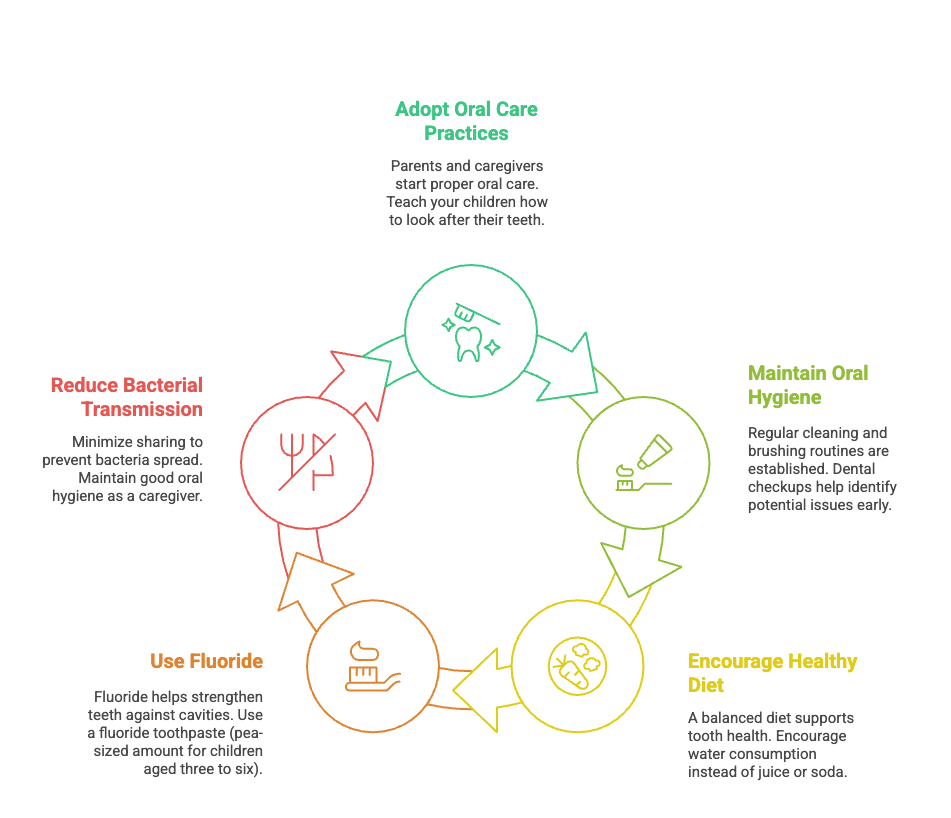Early childhood caries (ECC) is a significant public health problem affecting children worldwide. Early cavity is a severe form of tooth decay that occurs in young children, often before the age of six. ECC is not only painful but can also lead to long-term dental and health problems if left untreated.
This article examines the causes, risk factors, preventive measures, and treatment options for early childhood caries. Our team at Cosmedica Dental also discusses the importance of parental awareness in combating the dental caries risk.
What is Early Childhood Caries?
Early childhood caries is a form of severe tooth decay that affects the primary teeth of infants and young children. It is characterized by rapid progression and can lead to pain, infection, and difficulty eating, speaking, and sleeping. People used to know ECC as “nursing bottle caries” because of its association with prolonged bottle feeding. However, now we know that “baby bottle tooth decay” has multiple contributing factors beyond bottle feeding.
Causes and Risk Factors of ECC
Bacterial Infection & Lack of Fluoride
The main cause of an early caries experience is a type of bacteria called Streptococcus mutans. This bacteria feeds on sugar, cariogenic food and produces acid that damages the teeth. It can spread from parents or caregivers to children through saliva. This can happen when they share spoons, parents blow on food, or when they put a child’s pacifier in their mouth to clean it.
Fluoride strengthens tooth enamel and helps prevent tooth decay in surfaces in any primary. teeth Children who do not get enough fluoride, whether from water or toothpaste, are at higher risk of developing ECC.
Frequent Sugar Consumption & Poor Oral Hygiene
Sugary foods and beverages, including milk, infant formula, fruit juices, and sweets, play a significant role in ECC. When consumed frequently, these carbohydrates provide a constant food source for bacteria, leading to acid production and tooth decay.
Inadequate brushing and flossing allows plaque to build up on teeth and turn into tartar, increasing the risk of tooth decay. Many parents are unaware of the importance of early oral care. If they do not effectively clean their child’s teeth after the eruption of the first primary tooth in a child, ECC can develop quickly.
Prolonged Bottle or Breastfeeding at Night
Socioeconomic, Genetic and Developmental Factors
Studies show that children from low-income families are more likely to develop ECC in early months of age. This happens because of limited access to dental care, lack of oral hygiene education, and poor nutrition.
Some children may have naturally weaker enamel, making them more susceptible to tooth decay. In addition, conditions such as enamel hypoplasia can contribute to an increased risk of tooth decay.
CAVITIES?
Does your child have cavities? Don’t let early childhood caries compromise your child’s health!
Cosmedica Dental supports you in the prevention and treatment of cavities so you and your child can enjoy a healthy and confident smile. Schedule a free consultation today!
Signs and Symptoms
The early signs of ECC can be subtle, but early detection is crucial in preventing severe decay. Here are the common symptoms:
- White spots on teeth is the earliest sign of enamel demineralization, appearing along the gumline.
- As decay progresses, teeth may develop visible brown or black spots and fill tooth surfaces.
- A child may experience discomfort, pain and sensitive teeth while eating hot, cold, or sweet foods.
- Swollen or bleeding gums may indicate an infection or gum disease associated with tooth decay.
- Persistent bad breath can be a sign of bacterial overgrowth and tooth decay.
- Severe decay can affect a child’s ability to chew properly or pronounce words correctly.
Prevention of Early Childhood Caries
Prevention is the key to managing ECC and ensuring a child’s long-term oral health. Parents and caregivers play a critical role in establishing proper oral care and caries preventive practices from infancy.

Treatment Options for ECC
If ECC develops, early intervention is crucial to prevent further damage. Treatment options depend on the severity of the decay:
- Fluoride Treatments: For early-stage cavities, dentists may apply fluoride gels to remineralize enamel and prevent further decay.
- Dental Fillings: If cavities have progressed beyond the enamel, fillings may be necessary to restore the affected teeth.
- Crowns: For extensive decay, we place tooth-colored crowns over the affected teeth to preserve function and aesthetics.
- Tooth Extraction: In severe cases, the affected tooth needs to be extracted under local or general anesthesia. However, premature loss of primary teeth can lead to spacing issues for permanent teeth.
- Pulp Therapy: If decay reaches the pulp, we perform root canal treatment in Turkey at Cosmedica Dental.
The Importance of Parental Awareness
Parental education is a key factor in preventing ECC. Many parents underestimate the importance of baby teeth. However, untreated ECC can lead to:
- Speech and development issues
- Nutritional deficiencies
- Pain and infection
- Higher risk of cavities in permanent teeth
- Expensive dental treatments in the future
Conclusion - Early childhood caries (ECC)
Early childhood caries (ECC) is a preventable yet common disease affecting young children worldwide. Through proper oral hygiene, dietary choices and regular dental visits, parents can significantly reduce the risk of ECC. Recognizing early symptoms and seeking timely treatment can help ensure a child’s dental health and overall well-being.
Contact our dental clinic in Turkey for a dental analysis. By prioritizing preventive care, we can reduce the impact of ECC on children and promote a healthier future.